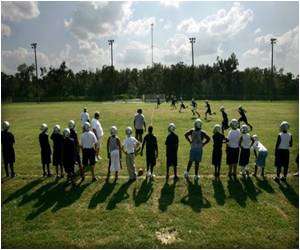Concussions are common among middle-school girls who play soccer and most of them continue to play with the symptoms.

Sports-related concussions account for 1.6 to 3.8 million injuries in the United States annually, including about 50,000 soccer-related concussions among high school players. Injury-tracking systems for younger players are lacking so they are largely unstudied, according to the study background.
Using an email survey and interviews, the authors evaluated the frequency and duration of concussions in young female soccer players, as well as whether the injuries resulted in stopping play and seeking medical attention. Their study included 351 soccer players (ages 11 to 14 years) from soccer clubs in the Puget Sound region of Washington.
Among 351 players, there were 59 concussions with 43,742 athletic exposure hours. Concussion symptoms can include memory loss, dizziness, drowsiness, headache and nausea. Cumulative concussion incidence was 13 percent per season with an incidence of 1.2 per 1,000 athletic exposure hours. Symptoms lasted a median four days (average 9.4 days). Heading the ball accounted for 30.5 percent of concussions. Most players (58.6 percent) continued to play with symptoms, with almost half (44.1 percent) seeking medical attention, according to the results.
The authors note that the rate of 1.3 concussions per 1,000 athletic exposure hours was higher than what has been reported in other studies of girls soccer at the high school and college levels.
"Future studies are needed to develop education strategies to ensure players understand and report concussion symptoms and that parents and coaches ensure appropriate medical evaluation and clearance before returning to play," the authors conclude. "Future studies should also compare short- and long-term outcomes for those who seek medical care and return to play according to recommended guidelines vs. those who do not seek medical care and/or return to play prematurely."
Advertisement









